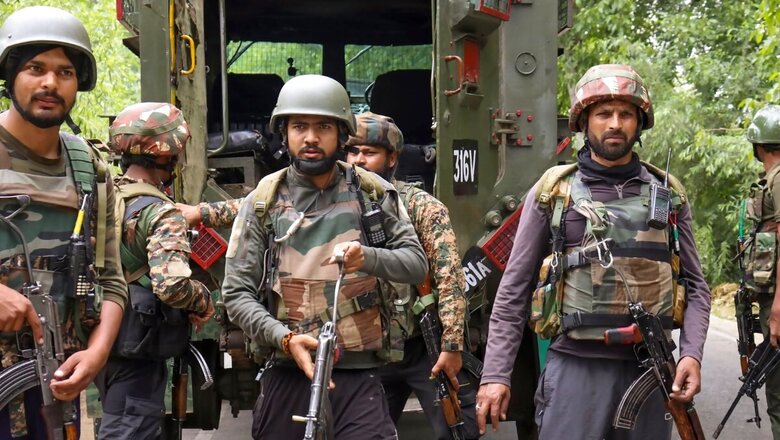
views
India has witnessed its third major terror attack in Jammu and Kashmir within the last three weeks. The rhythmic regularity of these attacks—occurring on June 9, 10, 11, 12, 26, and July 7, 8, and 16—indicates an increase in terror activities. According to media reports, 11 soldiers, including an airman of the IAF, have been killed this year. Public data reveals that 34 soldiers have died since 2021, while 40 terrorists have been killed during the same period. What can we infer from this?
Are the training standards for the Indian Army and the terrorists equally matched? Why are the Army casualties so high? Whether the personnel belong to the Army, Rashtriya Rifles, or Special Operations Group of the J&K Police, there appears to be something seriously amiss in India’s counter-terror operations. Is it insufficient training, weaponry, intelligence failure, or expertise that is causing these setbacks?
The nation is sick of reading meaningless messages like, “Indian Army stands with the bereaved families in this hour of grief,” or, “We will avenge the death of our soldiers and thwart the evil designs of terrorists and their associates,” or, “The attack is an attempt to revive terrorism in J&K,” or, “A proud moment for all of us, they made the supreme sacrifice.”
Compare these tepid statements with the Israeli response to the attacks by Hamas terrorists: “The first phase ends at these hours by the destruction of the majority of the enemy forces that penetrated our territory. At the same time, we started the offensive formation, and it will continue without reservation and without respite until the objectives are achieved,” stated Israeli Prime Minister Benjamin Netanyahu. “Then we will lock down the border and make sure that there are no other terrorists coming in,” he added. “And then we shall start to focus on hitting Hamas like we have never hit Hamas before,” declared Lt. Col. Jonathan Conricus, Israeli Defence Forces (IDF) spokesman.
The syllabus for security forces and foreign terrorists appears remarkably similar. Both engage in exercises, trials, development of prototypes and concepts, doctrine formulation, policy refinement, equipment acquisition, training, lessons learned, and interoperability demonstrations. India, with over 70 years of experience handling terrorism in Jammu and Kashmir, should be a global leader in counterterrorism efforts, encompassing deterrence, defence, crisis prevention and management, and cooperative security. However, the daily setbacks faced by security forces cast doubt on their effectiveness.
Another crucial factor to determine is whether the continuous interventions by highly trained and motivated fundamentalists near the International Border should be classified as “terrorism” or “disguised warfare.” Terrorism is typically defined as the calculated use of violence to generate fear, thereby achieving political goals when direct military victory is impossible. The fact that terrorists are focusing on military and police personnel suggests these are specific targets, primarily chosen to test the forces’ preparedness and the potential damage inflicted through unconventional tactics.
Active terrorist groups operating in different parts of India include Jaish-e-Mohammed, Lashkar-e-Taiba, Hizbul Mujahideen, ISIS, AQIS, Jamaat-ul-Mujahideen, the Communist Party of India-Maoist, and Jamaat-ul-Mujahideen Bangladesh. Whether these are fundamentalists operating as terrorists or personnel from Pakistan’s Army units posing as terrorists needs to be probed.
Brent Smith, in his study ‘A Look at Terrorist Behaviour: How They Prepare, Where They Strike’, states that international terrorists engage in nearly three times as many preparatory acts per incident. The average planning cycle for international terrorists is 92 days, compared to 14 days for environmental terrorists. While environmental terrorists commit an overwhelming majority of their preparatory activities in the week before the incident, international terrorists take up to six months to prepare. For law enforcement agencies, the implications of these patterns are significant.
Committing an act of terrorism usually involves local preparations. Although much of this conduct may not necessarily be criminal, early intelligence can give law enforcement the opportunity to stop the terrorists before an incident occurs. Knowledge of the threat — for example, understanding how long environmental or international terrorists prepare for their attacks — will affect the manner in which local officials respond. Identifying preparatory actions by environmental extremists may signal that an attack is imminent, whereas similar behaviour by an international group might suggest that an attack is still several months away.
For the last few years, it has been noticed that terrorists have been using American-made M4 carbine assault rifles in Jammu and Kashmir. There is a lot of speculation that these are “leftover” weapons of the US Army after its pull-out from Afghanistan in 2021, and they seem to have been appropriated by terrorists through their Pakistani handlers. The M4 carbine is a lightweight, gas-operated, air-cooled, magazine-fed, and shoulder-fired weapon. The M4 is available in several variants. The rifle is supposed to have a cyclic rate of fire of 700-970 rounds per minute and an effective firing range of 500-600 metres, and is reportedly in service with Pakistani special forces and the Special Security Unit of the Sindh Police.
To handle terrorism in all its forms and manifestations, and to develop new capabilities and technologies, there are many stakeholders engaged in counter-terrorism efforts today. The government should consider allotting housing plots for free, on a 99-year lease, to those exiting Agniveer service, to settle in border districts. They need to be given full weaponry and legal authorisation to neutralise any suspected terrorist, abettor, and financier. The presence of a highly trained and armed resident will open a new dimension and threat for Pakistani army men sneaking into India as terrorists. Sensitive border districts cannot be left to be populated exclusively by religious groups with affiliations and loyalties that overlook national interests.
To give teeth to counter-terror efforts, all terror offences need to be categorised as non-justiciable. Counter-terrorism should not only mean defensive measures; it should include unregulated offensive measures within a 50-kilometre belt across the Indian land, sea, and aerial borders.
The writer is a retired officer of the IRS and the former director-general of the National Academy of Customs, Indirect Taxes & Narcotics. Views expressed in the above piece are personal and solely that of the author. They do not necessarily reflect News18’s views.














Comments
0 comment